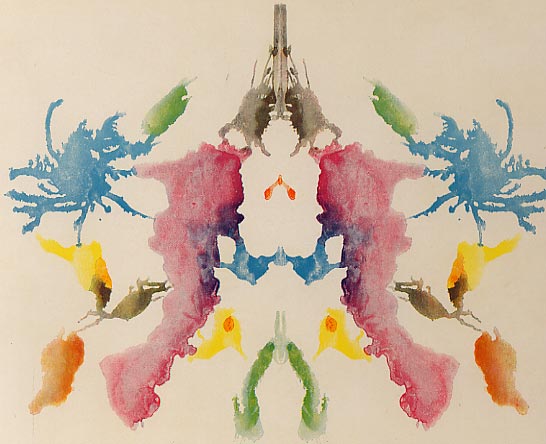 At one time or another, we all make mistakes. One day at the mall a woman
said she wanted to get some baked goods, so her husband suggested she go
into the bakery while he parked the car closer. At one time or another, we all make mistakes. One day at the mall a woman
said she wanted to get some baked goods, so her husband suggested she go
into the bakery while he parked the car closer.
When he entered the bakery he thought he saw his wife leaning over a bread
display. He sneaked up hehind her and gave her a big hug. The woman who
stiffened and turned around was a total stranger. Embarrassed, he apologized
and explained his mistake. But she smiled and said "don't be sorry.
a nice hug never hurt anyone."
I'm intrigued by the saying on the cover of Gretta Vospers book: "The
way we live is more important than the way we believe."
Both sides of the brain, the left or "reasoning" side and the right or "creative" side are interrelated through the corpus callosum. sometimes both sides work cooperatively and sometimes one side holds sway over the other, but they are always, somehow, in tandem, taking Vosper's saying one more step I would say that the way we live is what we believe and what we believe is the way we live, even though both sides of this truth may be difficult to discern.
Now let's turn to "the man who couldn't". One busy day at the
Alberta Hospital Ponoka, I was interrupted aby an urgent call from a psychiatrist
in our Outpatient department regarding a distressed couple. The 28 year
old husbands was a pastor in a fundamentalist church where he preached
God's authority and the literal interpretation of the Bible to his congregation
of born-again Christians. His wife, age 25, was the organist.
They had been married four years and had never consummated the marriage
because he experienced erectile dysfunction. although they loved one another
and longed to have children it was physically impossible for him to maintain
an erection. This was before the days of Viagra and modern sex therapy.
The couple had been seen by various professionals who were unable to determine
the physical or emotional source of the problem.
The psychiatrist heard their story and then said, "I'm afraid I can't
help you but i know someone who can. Dr. Crouse is a clinical psychologist
and I"m going to ask her to give you a Rorshach."
The doctor told me that the husband was in such distress we might have
to admit him to a psychiatric unit. so the doctor brought John (not his
real name) to my office and said, "This is Dr. Crouse. She will give
you a Rorschach".
The Rorschach is a diagnostic personality test. John would look at a series
of 10 inkblots and tell me what he saw there. The test would explore John's
level of conscious and subconscious awareness, revelaing how he saw himself
and others and the world around him. Hopefully, it would bring to light
some of John's hopes, fears and motivations. I would interpret the results
and pass them on to the psychiatrist to become part of Joh's treatment
plan.
John seemed anxious and fearful, trying to maintain control. He asked "Are
you a Christian?" "Trying to be one," I answered. He seemed
perplexed by my answer but came in and sat down. "I'm awfully nervous"
he stated, "and the psychiatrist says you're vbery busy, so let's
get started". "Of course", I said, "I'm going to show
you some inkblots and I'd like you to tell me what you see there, what
they look like to you." His hands were shaking but he took each card
in turn. He was very cooperative, describing in detail what he saw. Overall,
it was an excellent Rorschach.
As we moved to the second phase where he elaborated on what he had seen,
he asked, "how am I doing?" "You're doing just find, "I
reassured him." Are you sure this will help?" "Absolutely,
I know it will help."
When we finished I said, "Well, John, that's it. Thank you very much."
"Is that all? That's it?" he asked. He stood up, and looking
enormously relieved said, "I don't know how to thank you. I'm so grateful
for your help. God bless you." We shook hands and he left. I suddenly
realized that I had neglected to tell him that the Rorschach is just a
personality test. He had mistakenly perceived it as a treatment or even
a cure for his erectile dysfunction.
The next day the psychiatrist stopped by my office and asked, "Dorothy,
what did you do to that minister yesterday?" "I gave him the
Rorschach you requested. "I know that, but what else did you do to
him?" "Nothing, why?"
"Well, he phoned this moring to say that evberthing is working fine.
They were overjoyed to report that the marriage was consummated and celebrated.
They had high praise for Dr. Crouse, this wonderful woman whom God had
chosen to give John her unusual inkbot treatement."
Three months later they phoned with the news that they were expecting their
first baby. |
|
 At one time or another, we all make mistakes. One day at the mall a woman
said she wanted to get some baked goods, so her husband suggested she go
into the bakery while he parked the car closer.
At one time or another, we all make mistakes. One day at the mall a woman
said she wanted to get some baked goods, so her husband suggested she go
into the bakery while he parked the car closer.